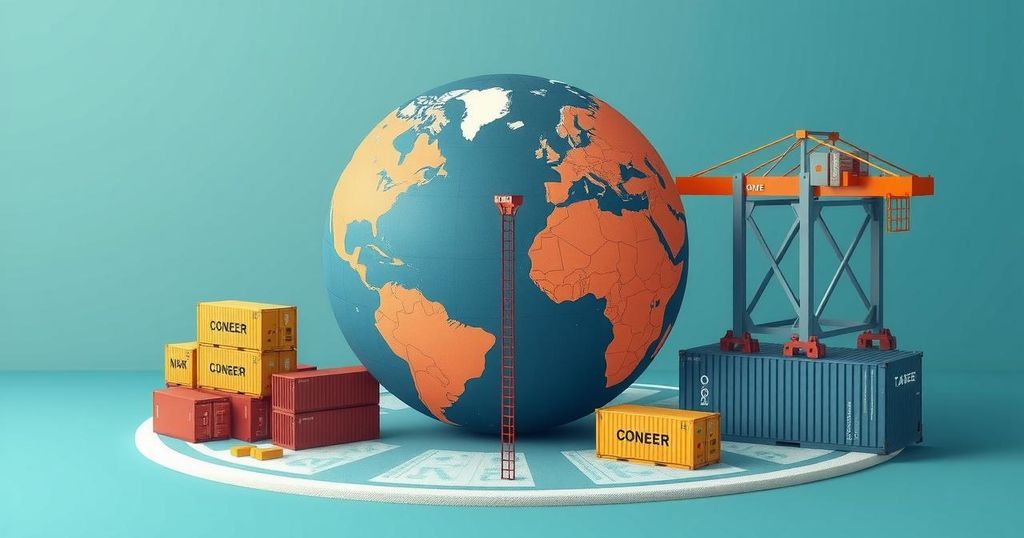Politics
ASIA, CANADA, CHINA, DONALD TRUMP, ECONOMICS, EUROPEAN, EUROPEAN UNION, GEOFF BENNETT, INFLATION, LAURA BARRON - LOPEZ, LAURA BARRÓN - LÓPEZ, MARKETS, MEXICO, NATIONAL SECURITY, NORTH AMERICA, PHILIPPINES, TARIFFS, TAX FOUNDATION, U. S, UNION, UNITED STATES, WHITE HOUSE, WHITE HOUSE COR
Nia Simpson
Understanding Trump’s Tariff Strategy on Major Trading Partners
President Trump is implementing 25 percent tariffs on goods from Mexico and Canada and 10 percent from China, with expected tariffs on the EU as well. Economists warn that this could disrupt supply chains and cost U.S. households an additional $830 annually. Canada is preparing a strong response, while reports indicate potential firings at the FBI.
President Donald Trump is advancing his tariff strategy, imposing a substantial 25 percent tariff on goods imported from Mexico and Canada, alongside a 10 percent levy on those from China. These changes are anticipated to begin implementation within days, with additional tariffs on the European Union also forthcoming. White House correspondent Laura Barrón-Lopez provides insight on these developments.
At a press conference, President Trump emphasized the goal of these tariffs, asserting they would enrich the United States and promote fair treatment of U.S. interests. He contended that the imbalance in tariffs between the U.S. and other nations necessitated this action, stating it was long overdue for a change.
Laura Barrón-Lopez reports that the impact of these tariffs is expected to be significant and unprecedented. Economists predict major disruptions as the tariffs will affect all goods from Mexico and Canada, potentially very severely altering existing supply chain dynamics. This could lead to increased costs for the American consumer, with estimates suggesting an annual household burden of approximately $830 due to these tariffs.
The reaction from international leaders has been swift; Canadian Prime Minister Justin Trudeau pledged an immediate and vigorous response to the tariffs. Canadian representatives are also currently in Washington, D.C., ready to negotiate with U.S. officials in a last-ditch effort to mitigate the potential economic fallout from these tariffs.
Additionally, Barrón-Lopez touches upon reports concerning firings within the Department of Justice affecting prosecutors linked to the January 6 riot cases. Trump appeared uninformed about the impending dismissals of several FBI agents, explaining that he felt there were indeed individuals within the agency who deserved to be removed, calling such actions a wise decision.
In summary, President Trump’s potential tariffs signify a shift in U.S. trade policy, eliciting varied reactions both domestically and abroad. The anticipated economic repercussions could substantively affect American households and trade relationships. The prospect of negotiations with Canada suggests a path to counterbalance the tariffs, amid additional developments within the Justice Department that may have far-reaching implications.
President Trump’s tariff proposal arises amidst ongoing discussions about the U.S. trade deficit and relationships with key partners like Mexico, Canada, China, and the European Union. These tariffs are not only a foreign policy matter but also a critical economic strategy that promises to reorder trade practices and impact American consumers significantly. Economists are particularly concerned about the long-term effects on industries reliant on cross-border supply chains.
The introduction of tariffs by President Trump poses significant changes to U.S. trade policies, particularly affecting relationships with major trading partners. While the administration insists these tariffs will benefit American interests, they may also lead to increased costs for consumers and complex negotiations with affected countries. The ongoing developments within domestic law enforcement bodies add another layer of complexity and concern surrounding this administration’s strategy.
Original Source: www.pbs.org








Post Comment